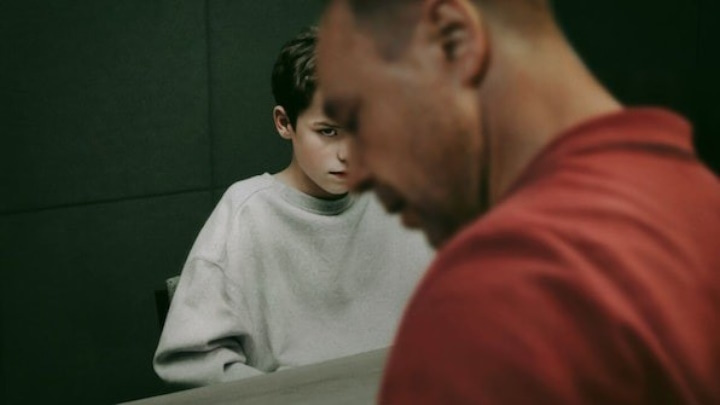Adolescence Shows What Happens When Parents Aren’t Really Present
Discover crucial insights about parenting teenagers in the digital era through the lens of Netflix's hit miniseries about a 13-year-old criminal. Learn how to bridge the generational gap and protect your teens from online dangers.
CULTUREFAMILY
5/15/20253 min read


The Unexpected Hit That's Sparking Important Conversations
Adolescence, the recent Netflix mini-series focusing on a 13-year-old boy accused of murdering a classmate has taken viewers by surprise, becoming an unexpected hit that's prompting meaningful discussions in households across the globe. Unlike typical crime dramas that focus on solving mysteries, this gripping series quickly reveals what happened and instead explores something far more valuable: the causes and devastating consequences of the crime, particularly on the family unit.
Digital Dangers: When Online Communities Replace Family
The mini-series masterfully illustrates how the teenage protagonist falls into a dangerous online community of men who feel rejected by women and develop hatred toward them as a response. This portrayal highlights a critical concern for modern parents: the digital world can provide refuge for isolated teens, but not all online communities offer healthy support.
Adolescence has always been a sensitive and turbulent period of development, but digital media and increasing isolation make today's teenagers particularly vulnerable to toxic online groups that exploit emotional fragilities. What makes this even more dangerous is how quickly these influences can take hold - sometimes in hours or days rather than the weeks or months it might take for positive family influences to make an impact.
The Generational Abyss: When Parents Don't See Their Children
Perhaps the most heartbreaking aspect portrayed in the series is what experts call the "generational abyss" - parents being completely unaware of their children's online activities and identities. This creates an environment where teens don't feel safe sharing important issues with their parents.
One profound moment in the series shows parents being utterly shocked when authorities arrive to investigate their son - illustrating how completely disconnected they were from his reality. Many parents watching can relate to this fear: do we truly know what's happening in our children's lives?
Digital Safety vs. Real Security: A False Choice
Many parents have responded to digital dangers by implementing strict screen time limits and monitoring software. While these strategies have merit, the series suggests something deeper: the issue isn't just about keeping children physically safe or monitoring their screen time - it's about creating secure bonds of love and nurturing their hearts.
As one child development expert notes, many parents mistakenly believed children would be safer in the virtual world than in the physical world. However, the digital landscape can expose children to far greater dangers, with the entire internet having potential access to their vulnerable minds.
Presence Over Protection: What Teens Really Need
The mini-series ultimately delivers a powerful message about what adolescents truly require from their parents: not just rules, restrictions, or even opportunities for success, but genuine presence. Research consistently shows that children can forgive many parental mistakes, but being ignored or rendered invisible leaves lasting wounds.
What emerges as the most valuable currency parents can offer is surprisingly simple yet increasingly rare: time and attention. Seeing teenagers for who they truly are rather than projecting expectations onto them creates the safety they need to navigate the complexities of adolescence without seeking validation from potentially harmful sources.
Creating Safe Spaces for Difficult Conversations
Many viewers report watching the series with their teenage children, finding it creates a natural entry point for difficult conversations that might otherwise never occur. By experiencing the story together, families can discuss sensitive topics through the safety of fictional characters before addressing personal situations.
This approach allows teens to process complex emotions and scenarios with parental guidance rather than turning exclusively to peers or online communities for interpretation.
Hope for Healing Family Relationships
For parents who recognize they've made mistakes or feel they've lost connection with their teens, the series offers reassurance that relationships can heal. It's never too late to begin building bridges of communication and trust with adolescents, even when previous attempts have failed.
Starting with simple acknowledgment of their reality and a commitment to being present without judgment can begin repairing even significantly damaged relationships. The most important step is recognizing that adolescents need to be seen for who they are, not who we wish them to be.
Key Takeaways for Parents of Teenagers
Prioritize connection over correction - Before addressing behavioral concerns, ensure your teen feels genuinely seen and heard.
Create tech-free family times - Establish regular periods where everyone, including parents, disconnects from devices to focus on each other.
Show interest in their digital world - Rather than simply monitoring screen time, express genuine curiosity about what interests them online.
Provide a judgment-free space - Teens need to know they can discuss difficult topics without immediate criticism or punishment.
Remember what truly matters - Beyond academic achievement and future success, emotional health and strong family bonds create resilient teens.
As this compelling mini-series reminds us, the challenges of raising adolescents in the digital age require more than technological solutions - they require our authentic presence and unconditional love.
Have you watched this miniseries with your teenager? What conversations did it spark in your home?
